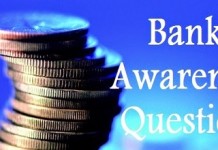Hello Aspirants,
Welcome to Banking Awareness Quiz in AffairsCloud.com. Here we are creating quiz covering important questions which are common for all the bank exams and other competitive exams.
- Which of the following is not a measure of the Risk Management in Banks?
A. CRR
B. RTGS
C. SLR
D. Deposit InsuranceB. RTGS
Explanation:
Cash reserve Ratio (CRR) is the amount of funds that the banks have to keep with the RBI. Statutory liquidity ratio (SLR) is the Indian government term for reserve requirement that the commercial banks in India require to maintain in the form of gold, government approved securities before providing credit to the customers. Deposit insurance is mandatory, and pays claims from a pool of funds to which every depository institution regularly contributes. - “The Doing Business Report” is prepared by which of the following organizations every year?
A. Asian Development Bank(ADB)
B. World Bank(WB)
C. New Development Bank(NDB)
D. World Trade Organization(WTO)B. World Bank(WB)
Explanation:
The Doing Business Report (DB) is a study elaborated by the World Bank Group since 2003 every year that is aimed to measure the costs to firms of business regulations. The study has become one of the flagship knowledge products of the World Bank Group in the field of private sector development, and is claimed to have motivated the design of several regulatory reforms in developing countries. - Which of the following cannot be called as a debt instrument as referred in financial transactions?
A. Certificate of Deposits
B. Bonds
C. Stock
D. Commercial PaperC. Stock
Explanation:
Debt instruments are assets that require a fixed payment to the holder, usually with interest. Examples of debt instruments include bonds (government or corporate) and mortgages. - Which of the following is not a type of cheque issued by an individual?
A. Bearer Cheque
B. Crossed Cheque
C. Order Cheque
D. Savings ChequeD. Savings Cheque
Explanation:
An order cheque can be a bearer cheque if the words or bearer are not cancelled out.A crossed cheque is a cheque that has been marked to specify an instruction about the way it is to be redeemed. - “World Investment Report” is annually published by ______
A. IBRD
B. WTO
C. IMF
D. UNCTADD. UNCTAD
Explanation:
The World Investment Report has been published annually since 1991.Each year´s Report covers the latest trends in foreign direct investment around the World and analyses in depth one selected topic related to foreign direct investment and development. - An account which remains in operative for an extended period of time is referred as ________
A. DEMAT Account
B. Dormant Account
C. Nominal Account
D. Deposit AccountB. Dormant Account
Explanation:
When there has been no financial activity for a long period of time, other than posting of interest, an account can be classified as dormant. - Scheduled banks are required to keep cash reserve with RBI, interms of _______
A. Section 24 of the Banking Regulation Act, 1949
B. Section 20 of the Banking Regulation Act, 1949
C. Section 42(i) of the RBI Act, 1934
D. Section 42 of Negotiable Instruments ActC. Section 42(i) of the RBI Act, 1934
Explanation:
Every bank included in the Second Schedule shall maintain with the Bank an average daily balance the amount. - Treasury bills are issued in India by ______
A. RBI
B. State Government
C. Government of India
D. SEBIC. Government of India
Explanation:
Treasury bills (T-bills) offer short-term investment opportunities, generally up to one year. They are thus useful in managing short-term liquidity. At present, the Government of India issues three types of treasury bills through auctions, namely, 91-day, 182-day and 364-day. There are no treasury bills issued by State Governments. - Banking Code & Standards Board of India(BCSBI) set up by ________
A. SEBI
B. Ministry of Finance
C. RBI
D. GOIC. RBI
Explanation:
The Banking Codes and Standards Board of India (BCSBI) is an independent banking industry watchdog that protects consumers of banking services in India. The board oversee compliance with the “Code of Bank’s Commitment to Customers” - The law regarding negotiable instruments is contained in __________
A. The Bill of exchange Act 1881
B. The Banking Regulation Act 1949
C. Cheques Act, 1881
D. The Negotiable Instruments Act, 1881D. The Negotiable Instruments Act, 1881
Explanation:
The Negotiable Instruments Act, 1881 – An Act to define and Law relating to negotiable instruments which are Promissory Notes, Bills of Exchange and cheques.
AffairsCloud Recommends Oliveboard Mock Test
AffairsCloud Ebook - Support Us to Grow
Govt Jobs by Category
Bank Jobs Notification


